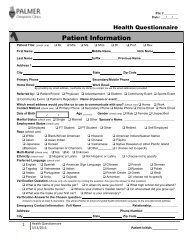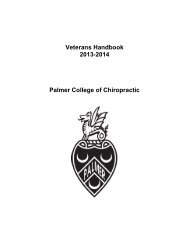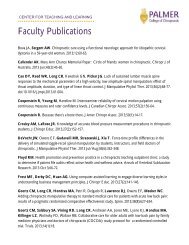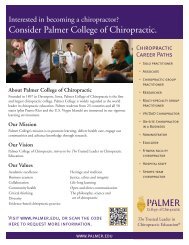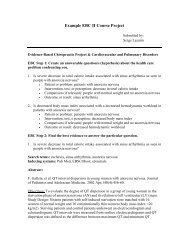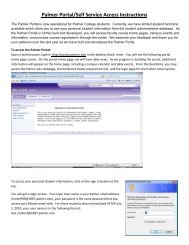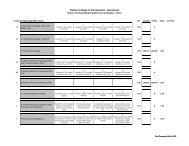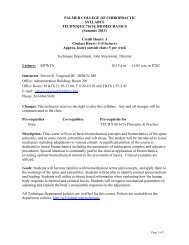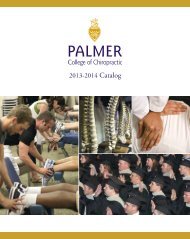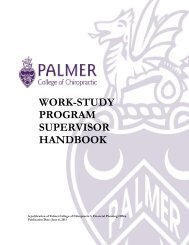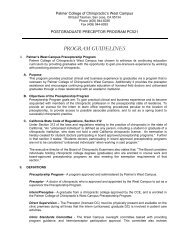ma1-091031-insightfal-bmf:Layout 1 - Palmer College of Chiropractic
ma1-091031-insightfal-bmf:Layout 1 - Palmer College of Chiropractic
ma1-091031-insightfal-bmf:Layout 1 - Palmer College of Chiropractic
Create successful ePaper yourself
Turn your PDF publications into a flip-book with our unique Google optimized e-Paper software.
are big supporters <strong>of</strong> good nutrition. “Nutrition provides the<br />
body with the building blocks to heal and maintain health,” he<br />
said. “Without proper nutrition, a healthy state is not possible.”<br />
The influence dietary choices have on the body’s inflammatory<br />
process has been a continuing theme for Florida Campus Parttime<br />
Instructor David Seaman, D.C., in class, at his practice and<br />
in the papers he has written. He recommends diets that largely<br />
consist <strong>of</strong> lean animal protein, vegetables, fruits, nuts and supplements<br />
as an alternative to anti-inflammatory drugs (NSAID). “This<br />
is because NSAIDs inhibit the enzyme that converts inflammatory<br />
dietary fatty acids into inflammatory prostaglandins,” he said.<br />
For Steve Osterhout, D.C., Davenport ’04, an interest in learning<br />
about and doing research on nutrition began at the age <strong>of</strong><br />
12 when he developed diabetes. As an undergraduate student,<br />
he added appropriate supplements to his diet and noticed<br />
encouraging changes.<br />
“My positive results motivated me to do further research and<br />
pay extra attention during my biochemistry courses at <strong>Palmer</strong>,”<br />
said the board certified clinical nutritionist, who does public<br />
health presentations and practices in Kalamazoo, Mich. “Since I<br />
personally experienced the benefits <strong>of</strong> appropriate nutrition I<br />
was eager to add it into my chiropractic protocol with patients.”<br />
Practice what you eat<br />
“Each and every one <strong>of</strong> us could do better, by avoiding fast foods<br />
and fatty foods,” said Casey Crisp, D.C., Davenport, ’97, who is a<br />
staff clinician in the Davenport Clinics. “The more you take care<br />
<strong>of</strong> yourself, the better you’ll be able to talk to your patients about<br />
ways they can improve their lives.”<br />
He also shares the belief <strong>of</strong> other D.C.s we interviewed, that the<br />
only person who should bring up a patient’s weight is the patient.<br />
“You have to work up to it, adding advice when that person’s<br />
diet comes up,” he said. “A lot <strong>of</strong> times, though, a patient with<br />
a weight problem who has tried many things<br />
to address it will say, ‘What else can I do?’<br />
That helps open the door to a wholehealth<br />
discussion.”<br />
How to add a daily<br />
serving <strong>of</strong> nutrition<br />
to your practice<br />
Davenport Campus Associate<br />
Pr<strong>of</strong>essor and Clinician<br />
Henry Mueller, D.C.,<br />
Davenport ’86, has written<br />
on a number <strong>of</strong> nutrition topics, such as how<br />
prenatal and infant nutrition is negatively affected by<br />
trans fat. He suggests that D.C.s starting a program to<br />
promote healthy eating should begin by recommending<br />
nutritional literature to their patients that’s in sync with<br />
chiropractic and holistic health.<br />
Ron Boesch, D.C., Davenport ’91, the assistant director <strong>of</strong> the<br />
Academic Health Center on the Davenport Campus, encourages<br />
alumni to promote nutrition to non-patients as well through<br />
public events like health talks.<br />
“You can make nutrition a part <strong>of</strong> a comprehensive health talk,”<br />
he said. “For example, a health talk about headaches could<br />
cover the common causes <strong>of</strong> headaches, such as subluxation,<br />
stress, neck muscle strain, toxins in the body and foods that<br />
may trigger them.”<br />
Davenport Campus Biochemistry Instructor Lia Nightingale,<br />
Ph.D., who has written on and about a number <strong>of</strong> nutrition topics,<br />
suggests that any patient interested in developing a healthy<br />
nutrition plan should be urged to have realistic expectations.<br />
“Get your patients to see the long-term benefits without focusing<br />
on the long road to get there,” she said. “Instead focus on<br />
short-term, easily attainable goals. Tell them, ‘This month try<br />
to eat one more serving <strong>of</strong> vegetables a day, then next month<br />
add another’.”<br />
Soon, you’re likely to notice some benefits yourself.<br />
Said Dr. Osterhout <strong>of</strong> his own efforts to guide his patients to<br />
eat healthfully, “Implementing nutrition into your practice is a<br />
great way to help patients achieve their wellness goals as well<br />
as create long-standing patient relationships.”<br />
17



